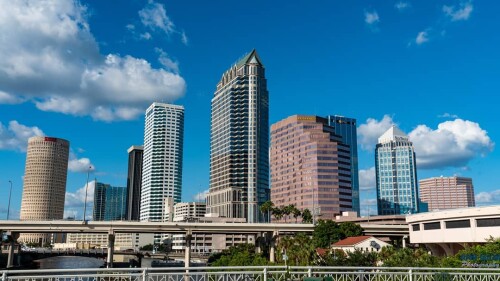The 1920s were a revolutionary time. Prohibition, economic growth, and social change dominated the national consciousness.
The Tampa Bay area was no exception, with the decade defined by a land + real estate boom, as well as an influx of tourism and population growth.
Here’s a breakdown of what TBAY was like in the 1920s:
Population growth
- 1920: Tampa population — 51,000
- 1930: Tampa population — 101,000
- 1920: St. Pete population — 14,000
- 1930: St. Pete population — 40,000
Economic developments
More people means more hotel rooms, jobs, and roads.
- The Gandy Bridge opened in 1924, making transportation across Old Tampa Bay significantly quicker. Four other bridges opened in Tampa in 1926 + 1927 including the James N. Holmes Bridge which still crosses the Hillsborough River on Florida Avenue.
- The Vinoy Park Hotel was built in 1926, the Hotel Floridan opened 1927, and The Don CeSar started taking reservations in 1928.
- The 284-mile Tamiami Trail connected Tampa and Miami when it was completed in 1928, after over a decade of construction.
- The 20s helped put the Cigar City on the map, and business was booming. In 1929, the city rolled its most cigars in a year, just shy of a staggering 505 million.

The Corral, Wodiska & Company cigar factory, 1929.
Photo via Florida Memory
Entertainment
There was also an increased want for entertainment, leisure, and sports.
- Several venues opened for shows that still exist today: the Coliseum in 1924, the Palladium Theater St. Petersburg in 1925, and the Tampa Theatre in 1926. Fun fact: The Palladium was originally a Christian Science church.
- Leisure options grew too: The St. Petersburg Shuffleboard Club was founded in 1924, Babe Zaharias Golf Course opened in 1926 (originally called the Forest Hills Golf and Country Club) along with several other Tampa Bay area golf courses.
- The Million Dollar Pier provided leisure options like a casino, beach, solarium, observation deck, and ballroom when it opened in 1926. The structure was demolished in 1967, and the St. Pete Pier now stands in its place.
- The New York Yankees’ ties to TBAY began in 1925, when the team started hosting their spring training season at St. Pete’s Huggins-Stengel Field. The field was formerly known as Crescent Lake Field.

Where are the beads?
Photo via Florida Memory
Historic events
- 1920-1921: a 10-month strike hit Ybor City’s cigar business, with 10,000+ workers left unemployed. The International Cigar Makers’ Union was nearly bankrupted + the strike was the longest in the history of the cigar trade.
- Oct. 25, 1921 was the last time a hurricane made landfall in the Tampa Bay area. Experts believe the Tarpon Springs storm was a Category 3 hurricane. There was a storm surge of up to 11 feet, and Bayshore Boulevard was severely damaged + completely washed away in places.
- Some evidence suggests Ybor City’s historic smuggle tunnels were built during the 1920s amid the emergence of gang culture. Legend has it they were used for criminal activity, including transporting alcohol to speakeasies during Prohibition.
If that’s not enough 1920s TBAY history for you, the Tampa Bay History Center recently opened a new exhibit. “Decade of Change: Florida in the 1920s” runs through July 14, 2024.











